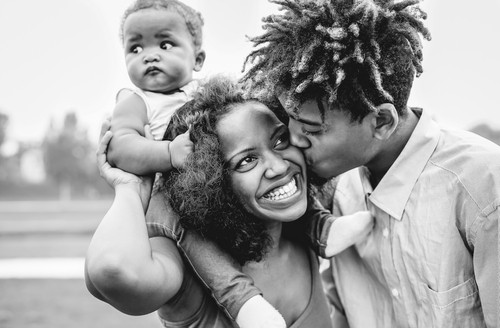America Needs a “Black Wives Matter” Movement To Rebuild the Black Family

By Delano Squires
For millions of people across the country, February is a time to reflect on the contributions black Americans have made to our rich national history. But for a handful of educators, the first week of this month is dedicated to amplifying year-round efforts to introduce the values of the Black Lives Matter movement into K-12 classrooms.
One of those principles is to “disrupt the Western prescribed nuclear family structure.” But rebuilding—not destroying—the black family should be the top priority for people who claim to care about race and equality.
What America needs today is a “Black Wives Matter” movement that reestablishes marriage as the foundation of black family life and increases the percentage of black children who are born to—and raised by—their married biological parents. At the core of this movement are three words: marriage before carriage.
“Marriage before carriage" was the norm for black Americans for most of the 20th century. U.S. Census data show that from 1890 to 1960, black men and women were more likely to be married by age 35 than their white counterparts. But by 1965, when the state of the black family concerned policymakers enough to issue the Moynihan report, one in four black children were born to unmarried parents. Today, the non-marital birth rate for black women is 70 percent, and 44 percent of black children live with a single mother.
The Left claims to care about racial equality, yet it's hard to find a single civil rights organization or progressive politician who will discuss this issue publicly. Their acceptance of the status quo is bad for women and children.
Over 45 percent of single mothers with children under the age of six live in poverty, while married couples with children have a single-digit poverty rate. Decades of research have also shown that children raised in homes with married parents have better social and emotional outcomes than children in any other arrangement.
A movement to revitalize the black family would do far more than address child poverty, however. Husbands and wives have duties toward one another, not just their children. A couple's vows express a commitment to stay together despite the difficulties—financial instability, illness, age—that every person will face at some point in life. A pledge to maintain the union “in sickness and in health” is not part of any cohabitation arrangement or co-parenting agreement I've ever heard of.
Rebuilding the black family requires a comprehensive and concentrated approach. That includes education. Middle and high school students need to learn about the three-step anti-poverty plan often referred to as the “Success Sequence”—finish high school, get a job, and marry before having children.
Historically black colleges and universities should also play a major role. Hampton University launched its National Center for Black Family Life last year. Others could follow its lead, equipping students to become spouses in addition to scholars. Some could even partner with local nonprofits to offer family support services to the surrounding community.
One of the most important institutions in this fight is the black church. Many black pastors across the country have thriving family ministries. Unfortunately, many progressive preachers see support for abortion access and same-sex marriage as more worthy social justice causes than rebuilding the black family.
A successful “marriage before carriage” campaign would also require a very different investment strategy for black cultural capital. Media, music, television, film, and social media must be harnessed to promote a culture of marriage and family. This would be a welcome change from music and imagery that conditions men to see women as disagreeable and sexually promiscuous.
But rebuilding the black family demands a transformation of black America's political priorities and cultural norms. Some people claim complex economic and social forces determine the life outcomes of a little black boy in the inner city. But, somehow, they believe that the relationship between the parents who created him is irrelevant to those outcomes. The truth is that many of our most vexing social ills, whether observed in the schoolhouse or the courthouse, result from what happens in the home.
If the ubiquity of BLM slogans and signs could change the minds of millions on matters of race, there is no reason to believe a Black Wives Matter movement wouldn't do the same for black family life. The fight for the black family will not be easy, but the health and well-being of our children are worth it.
This piece originally appeared in Newsweek.
For millions of people across the country, February is a time to reflect on the contributions black Americans have made to our rich national history. But for a handful of educators, the first week of this month is dedicated to amplifying year-round efforts to introduce the values of the Black Lives Matter movement into K-12 classrooms.
One of those principles is to “disrupt the Western prescribed nuclear family structure.” But rebuilding—not destroying—the black family should be the top priority for people who claim to care about race and equality.
What America needs today is a “Black Wives Matter” movement that reestablishes marriage as the foundation of black family life and increases the percentage of black children who are born to—and raised by—their married biological parents. At the core of this movement are three words: marriage before carriage.
“Marriage before carriage" was the norm for black Americans for most of the 20th century. U.S. Census data show that from 1890 to 1960, black men and women were more likely to be married by age 35 than their white counterparts. But by 1965, when the state of the black family concerned policymakers enough to issue the Moynihan report, one in four black children were born to unmarried parents. Today, the non-marital birth rate for black women is 70 percent, and 44 percent of black children live with a single mother.
The Left claims to care about racial equality, yet it's hard to find a single civil rights organization or progressive politician who will discuss this issue publicly. Their acceptance of the status quo is bad for women and children.
Over 45 percent of single mothers with children under the age of six live in poverty, while married couples with children have a single-digit poverty rate. Decades of research have also shown that children raised in homes with married parents have better social and emotional outcomes than children in any other arrangement.
A movement to revitalize the black family would do far more than address child poverty, however. Husbands and wives have duties toward one another, not just their children. A couple's vows express a commitment to stay together despite the difficulties—financial instability, illness, age—that every person will face at some point in life. A pledge to maintain the union “in sickness and in health” is not part of any cohabitation arrangement or co-parenting agreement I've ever heard of.
Rebuilding the black family requires a comprehensive and concentrated approach. That includes education. Middle and high school students need to learn about the three-step anti-poverty plan often referred to as the “Success Sequence”—finish high school, get a job, and marry before having children.
Historically black colleges and universities should also play a major role. Hampton University launched its National Center for Black Family Life last year. Others could follow its lead, equipping students to become spouses in addition to scholars. Some could even partner with local nonprofits to offer family support services to the surrounding community.
One of the most important institutions in this fight is the black church. Many black pastors across the country have thriving family ministries. Unfortunately, many progressive preachers see support for abortion access and same-sex marriage as more worthy social justice causes than rebuilding the black family.
A successful “marriage before carriage” campaign would also require a very different investment strategy for black cultural capital. Media, music, television, film, and social media must be harnessed to promote a culture of marriage and family. This would be a welcome change from music and imagery that conditions men to see women as disagreeable and sexually promiscuous.
But rebuilding the black family demands a transformation of black America's political priorities and cultural norms. Some people claim complex economic and social forces determine the life outcomes of a little black boy in the inner city. But, somehow, they believe that the relationship between the parents who created him is irrelevant to those outcomes. The truth is that many of our most vexing social ills, whether observed in the schoolhouse or the courthouse, result from what happens in the home.
If the ubiquity of BLM slogans and signs could change the minds of millions on matters of race, there is no reason to believe a Black Wives Matter movement wouldn't do the same for black family life. The fight for the black family will not be easy, but the health and well-being of our children are worth it.
This piece originally appeared in Newsweek.

Delano is a Research Fellow in Heritage’s Richard and Helen DeVos Center for Life, Religion, and Family.
Recent
The Heart of the Matter Is the Matter of the Heart
February 14th, 2026
People of Color can also steal…Duh?
February 14th, 2026
The Monroe Doctrine Isn’t Outdated — It’s Vital for American Security
January 5th, 2026
Defining Racism “UP”
January 4th, 2026
The Voting Rights Act Should Protect Voting—Not Perpetuate Fear
January 4th, 2026
Archive
2026
2025
February
March
July
September
October
November
2024
January
Cartoon 01/01/24Cartoon 01/02/24Claudine Gay Betrayed the American Values of My Black Elders to Exploit White GuiltCartoon 01/03/24Cartoon 01/05/24Cartoon 01/06/24Cartoon 01/07/24Cartoon 01/08/24We need a David, not a SaulCartoon 01/13/24Cartoon 01/09/24Cartoon 01/10/24Cartoon 01/11/24Cartoon 01/14/24Cartoon 01/12/24What Happens to a King Deferred? A ReduxCartoon 01/15/24Cartoon 01/16/24The Good Guys with Guns Part 1Cartoon 01/17/24America Works. DEI Doesn’t.Cartoon 01/18/24Cartoon 01/23/24Good Guys with Guns Part 2Cartoon 01/19/24Cartoon 01/21/24Cartoon 01/22/24Cartoon 01/24/24Cartoon 01/26/24Cartoon 01/25/24Cartoon 01/27/24
February
Cartoon 02/04/24Cartoon 02/03/24Cartoon 02/02/24Cartoon 02/01/24Cartoon 01/31/24Cartoon 01/28/24Cartoon 01/29/24We’ve Been Gay(ed) Part 1Cartoon 02/05/24Cartoon 02/06/24Cartoon 02/07/24Cartoon 02/08/24Cartoon 02/13/24Cartoon 02/12/24Cartoon 02/09/24Cartoon 02/11/24Cartoon 02/10/24Cartoon 02/19/24'Black America at Crossroads’ of Culture Wars as Presidential Election LoomsWe’ve Been Gay(ed) Part 2Cartoon 02/18/24Cartoon 02/17/24Cartoon 02/16/24Cartoon 02/15/24Cartoon 02/14/24Cartoon 02/22/24Cartoon 02/21/24Cartoon 02/20/24America Needs a “Black Wives Matter” Movement To Rebuild the Black FamilyCartoon 02/23/24Cartoon 02/24/24Cartoon 02/25/24Cartoon 02/26/24Cartoon 02/27/24

No Comments